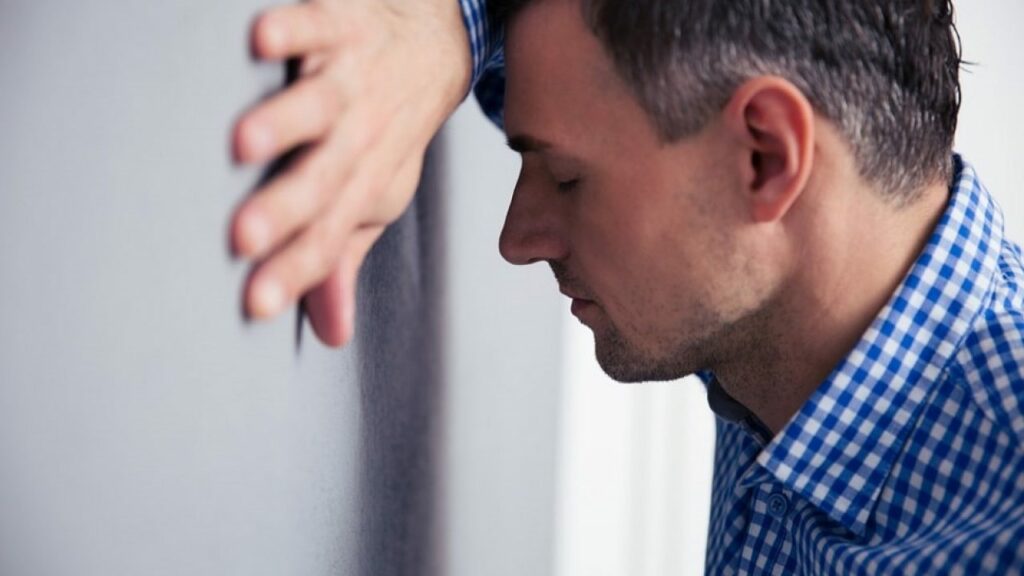A psychotic break is when a person experiences a loss of contact with reality. Psychotic breaks are generally triggered by some type of intense trauma or stressor. If you know someone who is at risk for this, there are ways you can help them cope and prevent the event from happening altogether.
Contents
- 1 What Is A Psychotic Break?
- 2 Signs Of Psychotic Break
- 3 Causes Of Psychotic Break
- 4 Long-Term Effects of a Psychotic Break
- 5 What to Do If Someone is Having Psychotic Break?
- 6 What to Do After Psychotic Break?
- 7 Diagnosis Of Psychotic Break
- 8 Treatment Of Psychotic Break
- 9 Self Care Tips For Coping With Psychotic Break
- 10 Related conditions With Psychotic Break
- 11 Conclusion
- 12 A Word From Therapy Mantra
What Is A Psychotic Break?

A psychotic break is a mental health emergency in which a person loses contact with reality. Psychotic breaks can be triggered by any type of intense trauma or stressor, such as the death of a loved one, a divorce, or being diagnosed with a life-threatening illness.
Symptoms of a psychotic break include hallucinations, delusions, and paranoia. A person may also become agitated and aggressive or may withdraw from friends and family.
If you know someone who is at risk for a psychotic break, there are things you can do to help them cope and prevent the event from happening. First, it is important to understand what causes a psychotic break. then you can look for warning signs that someone may be having a breakdown.
Signs Of Psychotic Break
There are many signs that may indicate a person is having a psychotic break. These include feelings of paranoia, hallucinations, delusions, and extreme agitation or aggression. You should seek immediate medical help if you believe someone is experiencing these symptoms. It is important to note that sometimes people who are experiencing a psychotic break may not appear to be ill. They might act perfectly normal or withdraw from family and friends. There are several signs that may indicate a person is having a psychotic break. These include:
- Hallucinations: Seeing, hearing, or feeling things that are not real.
- Delusions: Beliefs that are not based on reality. For example, a person with a delusion may believe that they are being followed or that someone is trying to harm them.
- Paranoia: extreme worry and suspicion of others.
- Agitation and aggression: Acting out violently or feeling extremely agitated and restless.
- Withdrawal: Avoiding friends and family and withdrawing from activities they once enjoyed.
- Anxiety: Feeling extremely anxious or fearful.
Causes Of Psychotic Break
 There are many causes of psychotic breaks. These include:
There are many causes of psychotic breaks. These include:
- Extreme mental or physical stress, such as loss of a loved one, death of a family member or pet, divorce, and major surgery.
- Drug use: Using drugs like cocaine and PCP can lead to psychotic breaks. Marijuana also has been known to trigger episodes in vulnerable people.
- Alcohol use: Excessive drinking can also trigger psychotic breaks in some people.
- Health problems: Disorders such as Alzheimer’s disease and Bipolar disorder may lead to psychotic breaks. Schizophrenia, a severe mental illness affecting 1 percent of the population, is one of the most common causes of a psychotic break.
Long-Term Effects of a Psychotic Break
While psychotic breaks can be incredibly traumatic, most people recover fully within two weeks. However, there are risks associated with experiencing a psychotic break that will last long after the event is over.
- Depression
- Post-traumatic stress disorder (PTSD)
- Drug abuse
- Alcohol abuse
- Suicide attempts
What to Do If Someone is Having Psychotic Break?

If you know someone who is at risk for a psychotic break, there are steps you can take to help them through the event. The first thing you should do if you suspect that someone is having a psychotic break is to try and calm them down.
Ask specific questions
If they are having hallucinations or delusions, try and bring them back into reality by asking specific questions about the person and place that seem to be causing their distress. If necessary, help reassure them that the person is not real or the situation is not true.
Hold them down
If they are extremely agitated or aggressive, you may need to use physical restraints such as holding them down or tying their hands to avoid injury. Remember to stay calm and speak in a reassuring tone.
Do not lie
Though it is important to try and make the person feel more comfortable, you should not lie or otherwise convince them that what they are experiencing is untrue. Doing so may invalidate their experience and make the event worse by worsening agitation or mistrust.
Help them find a calm place
If possible, help the person find a quiet and calm space. Try to steer them towards somewhere they are comfortable or familiar with. This can be their bedroom or living room, for example. If you cannot do this, try to take the person somewhere safe like an emergency room or a psychiatric facility.
Keep them safe
Remain calm and try to prevent the person from harming themselves or others. Do not leave them alone.
Get medical help
Seek immediate medical help if you believe someone is having a psychotic break. If the person is not in immediate danger, try to encourage them to seek help on their own. It may be helpful to tell the person you are concerned about them and want to get them some help.
If someone is experiencing disturbing thoughts or behaviors, you should remove firearms, drugs, or sharp objects from their vicinity until they can be taken to a doctor.
You should never leave a person having a psychotic break alone, even if they are calm. It is important to keep the person safe until they recover. If necessary, call 911 or take them to the emergency room for treatment.
What to Do After Psychotic Break?

After experiencing a psychotic break, it is important to find effective coping methods to deal with the trauma.
- First, try and get plenty of sleep so that you are well-rested when you face your fears.
- During this time, it may help to use distraction techniques such as coloring or doodling while engaging in a relaxing activity like yoga or meditation.
- You can also read books, magazines, comics, and other materials that can help you escape from your worries.
It is important to remember that a psychotic break is not your fault and does not mean there is anything wrong with you. You should never blame yourself or feel ashamed about what happened. It’s simply a stressful event in which your mind responded the only way it could be shutting down temporarily.
Diagnosis Of Psychotic Break
A psychotic break is a serious mental health condition that requires professional medical attention. It can be diagnosed through a number of methods, including psychiatric evaluation, blood tests, or brain scans.
If you or a loved one is experiencing symptoms of psychosis, it is important to seek help from a medical professional as soon as possible.
Treatment Of Psychotic Break

There are a number of treatments available for people who have experienced a psychotic break.
Medication
One common treatment is medication. Doctors may prescribe antipsychotic drugs to help control the symptoms of psychosis. It is important to take medication as prescribed and to follow up with your doctor regularly.
antipsychotic drugs:
- Haldol (haloperidol)
- Risperdal (risperidone)
- Seroquel (quetiapine)
- Zyprexa (olanzapine)
Therapy
Another common treatment is therapy. Therapy can help people understand and cope with the emotional effects of a psychotic break. It can also help people learn how to prevent another psychotic break from happening.
There are also other treatment methods available, including talk therapy and support groups.
Cognitive Behavioral Therapy (CBT)
Cognitive-behavioral therapy (CBT) is a psychotherapeutic treatment that helps people understand how their thoughts, feelings, and behaviors are related. It can be very effective in treating conditions like schizophrenia.
Psychotherapy
Psychotherapy is a counseling-based form of mental health treatment that addresses the emotional aspects of psychosis. This may include anxiety, stress, depression, and other emotional effects.
Electroconvulsive Therapy (ECT)
Electroconvulsive therapy (ECT) is a procedure in which seizures are electrically induced in patients to provide relief from serious mental illness. It can be an effective treatment for people who do not respond to medication or psychotherapy alone.
Psychodynamic Therapy
Psychodynamic therapy is a form of therapy that focuses on unconscious mental processes. It can be useful for people who want to understand the psychological causes or origins of their psychosis.
Family therapy
Family-focused therapy helps people develop coping strategies for dealing with psychosis. It also involves the family in the recovery process so they can provide support to the person struggling with psychosis.
Support groups
You should not be afraid to seek help even if you do not have a medical diagnosis for what you are experiencing. It is often beneficial to attend a support group in which people with similar symptoms can come together and share coping strategies.
Some people may also need to be hospitalized for a short period of time in order to receive treatment and be monitored for their safety.
It is important to seek treatment as soon as possible after experiencing a psychotic break in order to improve the chances of recovery.
Self Care Tips For Coping With Psychotic Break

There are a number of things you can do to help cope with a psychotic break.
1. Seek professional help. This is the most important thing you can do. A psychotic break is a serious mental health condition and requires professional treatment.
2. Take medication as prescribed. Antipsychotic drugs can help control the symptoms of psychosis. It is important to take medication as prescribed and to follow up with your doctor regularly.
3. Attend therapy. Therapy can help you understand and cope with the emotional effects of a psychotic break.
4. Stay connected to family and friends. These people can provide support during your recovery.
5. Join a support group. Support groups can offer emotional support and coping strategies.
6. Get enough sleep, eat a healthy diet, and exercise regularly. Proper self-care is an important component in coping with a psychotic break.
7. Maintain a regular daily schedule. Try to stick to the same daily activities each day for stability and structure within your life.
8. Find new coping strategies. Coping strategies can provide you with ways to help deal with stress and negative emotions on a day-to-day basis.
9. Stay positive. Try to maintain a positive outlook, even if it is difficult. Positive thinking can be very beneficial in coping with psychotic breaks.
10. Avoid drugs/alcohol/tobacco. These substances can interfere with treatment and may make psychosis worse.
Related conditions With Psychotic Break
Some people may also experience other mental health conditions along with a psychotic break, such as:
- Depression – Depression can sometimes occur along with psychosis. People who are depressed may be more likely to experience a psychotic break.
- Bipolar disorder – Bipolar disorder is a condition in which a person experiences periods of mania and depression. A person with bipolar disorder may be more likely to experience a psychotic break.
- Schizophrenia – Schizophrenia is a serious mental illness that is characterized by hallucinations and delusions. People with schizophrenia are at risk of experiencing a psychotic break.
Conclusion
We want to help you get back on your feet and feel confident in your mental health. A psychotic break is a symptom of schizophrenia, which affects about 1% of the population. Psychotic breaks can be terrifying for people who experience them, but they don’t have to stay that way! The first step is getting professional support from an experienced psychiatrist or psychologist with knowledge about schizophrenia.
A Word From Therapy Mantra
Your mental health — Your psychological, emotional, and social well-being — has an impact on every aspect of your life. Positive mental health essentially allows you to effectively deal with life’s everyday challenges.
At TherapyMantra, we have a team of therapists who provide affordable online therapy to assist you with issues such as depression, anxiety, stress, workplace Issues, addiction, relationship, OCD, LGBTQ, and PTSD. You can book a free therapy or download our free Android or iOS app.


